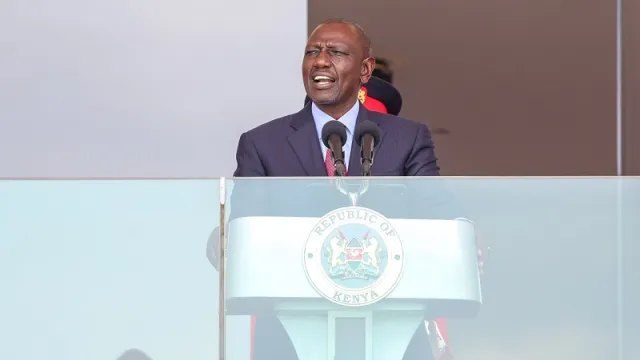Ruto's sword remarks and the fraying rule of law

Ruto's sword remarks and the fraying rule of law
As an independent republic, Kenya is propelled by the guiding force of democracy. The rule of law constitutes the heart and soul of a constitutional democracy; without it, the country would be merely lifeless, existing in a state akin to skeletons. As world history demonstrates, it has become evident that the weakness of the rule of law fosters chaos and disorder in countries that have neglected or buried it.
Our close neighbours, such as Sudan, have endured their bitter and grave share of disruptions and anarchy due to the undermining of the rule of law. Sudan has teetered on the brink of wiping itself from the face of the earth.
Now, more than ever before, the sacrosanct rule of law is existentially threatened by the capricious whims of the President. Dr Ruto is on record for having quipped, "sword ni ya kufyeka wakora hapa," referring to the ceremonial sword handed over to him by his predecessor, Uhuru Kenyatta. This poses a clear and present danger of the country regressing to the dark days of political repression.
Rule of law
A nation governed by democracy under the supreme law of the land—the new Constitution—should not elude Ruto that our much-acclaimed Constitution vests in the State officer the responsibility to serve the people, rather than the power to rule them, as provided under Article 73 outlining the responsibilities of leadership. The profundity of this Article seeks to check and regulate the exercise of Ruto’s power over the citizens who voted him into office.
The president need not be reminded that everyone is subject to the law. Additionally, all persons are equal before the law, regardless of status, social group, age, gender, or any other classification of the people of Kenya. He took an oath to protect the Constitution, and as a result, the sword symbolizes a tool to be used for that purpose. Seemingly, lessons from historical and biblical leaders clearly show that the sword symbolizes his position in the Armed Forces as the Commander-In-Chief.
As the legal field has evolved in tune with the realization of democracy, the swords handed over to democratically elected leaders like Ruto have acquired a new purpose: to protect, rather than to eliminate or, in the words used, 'kufyeka.'
The rule of law establishes a system of accountable governance, creating independent institutions to interpret the law and hold violators accountable for their actions. These institutions operate within clear and comprehensive legal frameworks, encompassing both laws and procedures. The Courts of law act independently, free from any interference.
The Courts stand as noble custodians of the rule of law and democracy as a whole. Ruto should utilize the Courts as the proper legal avenue to bring accused persons to justice or to address the issue of ‘kufyeka wakora’. Former Chief Justice Willy Mutunga emphasizes that the courts are temples of justice.
Read also: How insurance can serve as a governance mechanism in building climate resilience in Africa
Courts of law
The remarks about the sword undermine the role of the Courts of law, suggesting actions the president intends to take against imaginary criminals. These actions include taking the law into his own hands to restrain leaders who oppose his housing levy. However, every leader has the right to hold and express different opinions on any matter affecting the people.
The court's jurisdiction lies in hearing and determining a matter involving the criminal responsibility of an accused person. Subsequently, an accused is presumed guilty or acquitted of the charges.
Undermining this role, however, means that the separation of powers among the three branches of government is threatened. This is akin to poisoning the lively democracy to death.
Therefore, respecting and adhering to the Constitution by the President would fulfill the mandate of protecting it, which he took an oath to uphold. The Constitution establishes various bodies responsible for holding 'wakora' liable. The growing democracy in Kenya will mature and ripen when these bodies operate efficiently and effectively, away from degrading utterances of leaders that threaten their powers.
Kithinji Nturibi is a law student at Mount Kenya University. [email protected]



